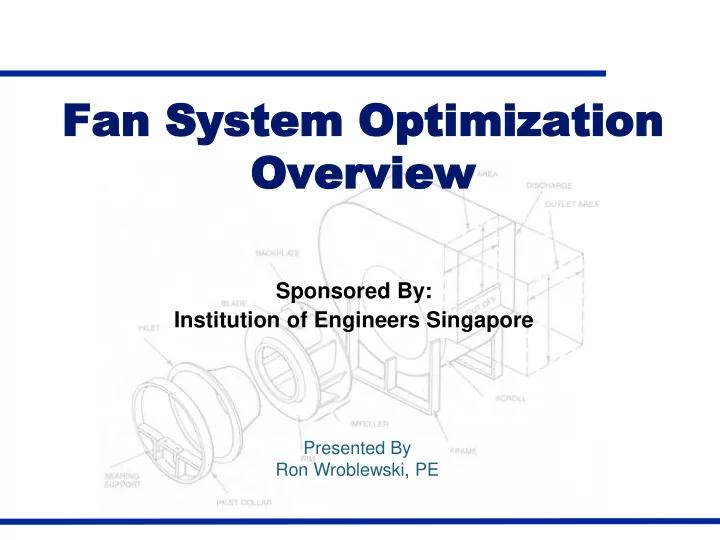

Fan Fan System Optimization System Optimization Overview Overview Sponsored By: Institution of Engineers Singapore Presented By Ron Wroblewski, PE
What is Efficiency? output Useful Output or input Energy Input Efficiency is the portion of energy you paid for that is actually doing the work
What is Deficiency? deficiency 1 Deficiency is the energy working against you. • Heat, • Vibration, and • Noise
Damper Locations Rolling Mill Reheat Furnace Example
Optimization Benefits Financial Corporate Production Maintenance Safety Environmental Societal Time Magazine April 5, 2004
Characteristics of Fan Systems Tough Enduring They will suffer years of abuse quietly, because of their resilient nature. To the untrained eye, the inefficient fan and the efficient fan look the same. The conditions that cause them to work inefficiently are everyday occurrences.
Measuring Fan Systems ISO 5802 • Very specialized skill • Not taught at university • Skills and techniques needed to measure the performance of a fan system draw from — Calculus — Fluid dynamics — Thermodynamics and — Psychrometrics
Measuring Fan Systems ISO 5802 • Flow is difficult to measure. • Because the air in the duct has mass and momentum, the flow is: — Unsteady — Pulsing — Uneven • Affected by twists, turns, contractions and expansions in the ductwork
Variable Frequency Drives • Price has been decreasing • Reliability has been increasing • Becoming much more common • Not a panacea • Is there variation in the load? • Not suited for constant loads • Helps reduce mechanical maintenance • Can cause electrical power quality problems
Other Optimization Strategies 1. Replace belts and pulleys to slow down the fan 2. Replace the impeller with more efficient model 3. Replace fan with more efficient model 4. Convert to belt drive 5. Use Variable Inlet Vanes 6. Streamline airflow and reduce friction at key choke points
Other FSO Strategies Advantages: • Often lower cost than VFDs • Solutions more deeply rooted in the system Disadvantages • Not as sexy • Requires training, knowledge and hard work • May require measuring the fan performance • Requires the boss to fund a FSO study
FSO Tools and Training – US DOE • Fan System Assessment Tool (FSAT) Software: • Free from US DOE • Basic fan online training on US DOE website • Loads of publications available for download — Efficiency guides — Tip sheets — Case studies
FSO tools and training - Productive Energy In-Person Training • Introductory to advanced level • ½ day to 5 day duration • Measuring equipment available • Classroom demo for measurement lab • On-site measurement of fan systems • Remote coaching
FSO online training – productiveenergy.com • Informal cooperation with AMCA International • 6 modules already online — Motors intro — Psychrometrics — Heat Recovery* — Simplified affinity laws — Fan controls — Measuring fan performance • 4 modules under development or upgrade • Total of 15 modules planned
Case Study – Malting Expansion of a malthouse Germination beds Spray pumps Heat Exchangers 4 fans serve the kiln Fluctuating conditions P t loss across new Highland Park Malting House system, ~11 in/wg Space constraints
Malting – Proposal Options Proposal #19107 Proposal #19108 Proposal #19207 730 SWSI = $30,030 670 DWDI = $39,835 660 DWDI = $40,955 Q 150,000 ACFM Q 150,000 ACFM Q 150,000 ACFM P s 11 in/wg P s 11 in/wg P s 11 in/wg .072 lbs/ft 3 .072 lbs/ft 3 .072 lbs/ft 3 ρ ρ ρ N 875 RPM N 890 RPM N 890 RPM HP 387 BHP HP 379 BHP HP 359 BHP P s(Max) 14 in/wg P s(Max) 11.8 in/wg P s(Max) 14.2 in/wg ŋ 67% ŋ 68% ŋ 72%
Malting – Analyses
Malting – Simple Payback Proposal #19107 Proposal #19207 BHP 387 359 Cumulative BHP 1,548 1,436 Difference kW 1,154.8 1,071.3 83.6 kWh/yr, @8000 Hours 9,238,464 8,570,048 668,416 $/yr, @ $0.05/kWh 461,923 428,502 33,421 First Cost $ 30,030 $ 40,955 $ 10,925 Cumulative First Cost $ 120,120 $ 163,820 $ 43,700 16 months Simple Payback
Case Study – Coke Oven
Steel Mill – Coke Oven Baghouse Fan 670-683 Type R37A DIDW
Steel Mill – Coke Battery Summary • 2 @ 2000 hp • Intermittent process cycles • 13.8 kVa • Savings $369 000 / year • Cost $929 000 • Simple payback 2.5 year
Steel Mill Hot Dip Plating Line • 22 Fans • Size 50 to 200 hp • Damper controlled Savings $883 000 /year Cost $751 000 Simple payback 0.9 Years
Thank You! Ronald G. Wroblewski, P.E. Madison, WI 53726 1 (608) 232-1861 www.productiveenergy.com ron@productiveenergy.com
Recommend
More recommend